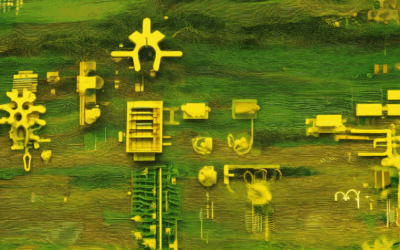In the ever-evolving landscape of digital innovation, businesses must stay ahead of the curve to thrive. Understanding the latest technological advancements and adopting them strategically can drive growth, efficiency, and customer satisfaction. This article delves into the key digital and tech trends shaping industries in 2023 and beyond, offering insights into how businesses can leverage these innovations to stay competitive. From artificial intelligence and machine learning to cloud computing and blockchain, explore the technologies reshaping the business world and how companies can integrate them to achieve success. Discover how emerging trends like augmented reality, virtual reality, and cybersecurity are transforming operations, and learn about the rise of sustainable and green tech solutions. Whether you’re looking to future-proof your business or simply want to stay informed, this comprehensive guide will provide you with the knowledge needed to navigate the dynamic tech environment.
Key Takeaways
– Artificial Intelligence (AI) and Machine Learning: Drive decision-making, personalize customer experiences, and optimize workflows with tools like Iterati.org’s AI platforms.
– Blockchain Technology: Secure transactions, revolutionize supply chain management, and enable decentralized systems across industries.
– Quantum Computing: Solve complex problems faster than traditional computers, with potential applications in cryptography and drug discovery.
– Internet of Things (IoT): Automate operations, connect devices, and enhance efficiency in smart factories and remote monitoring systems.
– Augmented Reality (AR) and Virtual Reality (VR): Create immersive experiences for training, customer engagement, and data visualization.
– Biotechnology and Gene Editing: Transform healthcare and agriculture with precise solutions like CRISPR.
– Web3 and Decentralized Applications: Revolutionize industries such as finance, gaming, and social media with decentralized platforms.
– Cybersecurity: Protect sensitive data with advanced measures like zero-trust architecture and AI-driven threat detection.
– Space Exploration and Colonization: Drive innovation in spacecraft design and propulsion systems for future endeavors.
– Autonomous Systems: Transform logistics and delivery services with autonomous vehicles and drones.
– Edge Computing: Reduce latency and improve efficiency in IoT applications by processing data closer to the source.
– Digital Twin Technology: Simulate physical systems for better decision-making and predictive maintenance across industries.
By leveraging these technologies, businesses can stay ahead of the curve and adapt to a rapidly evolving landscape. Visit Iterati.org to explore more insights and resources.

Technology Trends in Business
Technology trends in business are constantly evolving, driven by innovations that enhance efficiency, security, and customer engagement. Here are some prominent trends shaping the modern business landscape:
- Digital Transformation : The migration of traditional businesses to digital platforms, encompassing cloud computing, e-commerce, and digital marketing, has become essential for survival and growth.
- Artificial Intelligence (AI) and Machine Learning : AI-driven tools are revolutionizing customer service, data analysis, and decision-making processes, offering unprecedented efficiency and insight.
- Blockchain Technology : Beyond financial transactions, blockchain is being adopted for secure supply chain management and decentralized systems, enhancing transparency and security.
- Sustainability and Green Technologies : Businesses are embracing eco-friendly solutions, such as renewable energy integration and energy-efficient data centers, to align with global sustainability goals.
- Cybersecurity : As digitization increases, robust cybersecurity measures are critical to protect sensitive data and maintain trust with customers.
- Remote Work Tools : The rise of remote work has made tools like Zoom, Slack, and Microsoft Teams indispensable for fostering collaboration and communication.
- Data Analytics : Advanced analytics tools enable businesses to harness data for informed decision-making, driving innovation and operational improvements.
- Cloud Computing : The shift to cloud-based solutions offers scalability, flexibility, and cost-efficiency, with major providers like AWS, Azure, and Google Cloud leading the charge.
- Internet of Things (IoT) : IoT devices are transforming industries through data collection and connectivity, though cybersecurity remains a significant concern.
- Edge Computing : Processing data closer to its source reduces latency, enabling real-time applications in fields like autonomous vehicles and industrial automation.
- Augmented Reality (AR) and Virtual Reality (VR) : These immersive technologies are being integrated into gaming, education, and marketing, offering unique user experiences.
These trends collectively redefine how businesses operate, adapt to market changes, and deliver value to their stakeholders, ensuring continued success in a rapidly advancing technological environment.
Technology Trends Shaping Businesses Today
As the digital landscape continues to evolve, several technological advancements are reshaping how businesses operate, innovate, and connect with their audiences. Here are the key trends driving this transformation:
- Artificial Intelligence (AI): AI is revolutionizing decision-making, customer service, and operational efficiency. Tools like chatbots and predictive analytics are becoming essential for businesses to stay competitive.
- Cloud Computing: The shift to cloud-based solutions has enabled businesses to scale more efficiently, access data remotely, and reduce IT costs. Major platforms like AWS and Azure dominate the market.
- Internet of Things (IoT): Integrating sensors and connected devices into daily operations allows businesses to optimize supply chains, monitor equipment, and enhance customer experiences in real-time.
- Remote Work and Collaboration Tools: Technologies like Slack, Zoom, and Microsoft Teams have become cornerstone tools for teams worldwide, enabling flexible work arrangements and improved productivity.
- Cybersecurity: With increasing cyber threats, businesses are prioritizing robust security measures. Solutions like multi-factor authentication and zero-trust frameworks are becoming standard practices.
- Blockchain and Distributed Ledger Technology: Blockchain is transforming industries from finance to healthcare, offering secure, decentralized solutions for transactions and data management.
- Augmented Reality (AR) and Virtual Reality (VR): These technologies are being adopted in training simulations, marketing campaigns, and customer experiences, providing immersive ways to engage with products and services.
- Sustainability and Green Technology: Businesses are embracing eco-friendly practices and technologies to reduce their carbon footprint, aligning with global efforts to combat climate change.
These trends are not just future predictions—they’re the present reality, driving innovation and transformation across industries. By staying ahead of these technological shifts, businesses can position themselves for long-term success in an ever-changing world.

Which technology is trending in the IT industry?
As of April 29, 2025, several technologies are leading the charge in the IT industry, shaping the future of technology and its applications. Here’s an overview of the most prominent trends:
1. Artificial Intelligence (AI) and Machine Learning (ML)
AI and ML continue to dominate the tech landscape, enabling machines to learn from data and make autonomous decisions. Applications range from facial recognition to natural language processing, driving advancements in areas like healthcare, finance, and autonomous vehicles.
2. Cloud Computing
Cloud computing remains a cornerstone of modern IT infrastructure. Companies are increasingly adopting hybrid and multi-cloud strategies to enhance scalability, flexibility, and cost-efficiency. Major players like AWS, Azure, and Google Cloud are leading this space.
3. Cybersecurity
With the rise of remote work and digital transformation, cybersecurity has become paramount. Technologies like AI-driven threat detection, zero-trust frameworks, and encryption are revolutionizing how organizations protect their data and systems.
4. Blockchain
Blockchain technology extends beyond cryptocurrencies, finding applications in supply chain management, healthcare records, and financial transactions. Its decentralized nature and immutability make it highly secure and versatile.
5. Internet of Things (IoT)
The proliferation of connected devices has brought IoT to the forefront. Smart homes, wearables, and industrial IoT solutions are transforming daily life and business operations, driven by advancements in sensor technology and data analytics.
6. Augmented Reality (AR)/Virtual Reality (VR)
AR and VR are gaining traction in industries like gaming, education, and virtual collaboration. Their immersive experiences are redefining entertainment, training simulations, and remote work.
7. Edge Computing
Edge computing brings computation and data storage closer to the source of data generation, reducing latency and enhancing real-time decision-making. It’s crucial for applications like autonomous vehicles and industrial automation.
8. 5G Networks
The rollout of 5G networks is enabling faster connectivity and supporting emerging technologies like IoT and autonomous vehicles. It’s reshaping communication and data transfer capabilities globally.
9. DevOps and Continuous Integration/Continuous Deployment (CI/CD)
DevOps practices and CI/CD pipelines have become standard in software development, accelerating the delivery of high-quality software products through collaboration between development and operations teams.
10. Low-Code/No-Code Platforms
These platforms empower non-developers to create applications, reducing the time and effort required for custom coding. They’re widely used in business process automation and digital transformation initiatives.
11. Web3 and Decentralized Applications
Web3 represents the next evolution of the internet, focusing on decentralization, tokenization, and user-owned platforms. It’s influencing domains like finance (DeFi), gaming, and social media.
12. Metaverse and Virtual Reality (VR)
The metaverse combines virtual reality, augmented reality, and blockchain technology to create immersive digital worlds. It’s expected to redefine social interactions, gaming, and virtual events.
13. Quantum Computing
Quantum computing holds the potential to solve complex problems exponentially faster than classical computers, impacting fields like cryptography, drug discovery, and optimization.
14. Data Analytics and Business Intelligence
Advanced data analytics tools are transforming how businesses make decisions, leveraging big data and AI to extract actionable insights from vast datasets.
15. Sustainability in IT
Sustainability is becoming a key focus, with initiatives like green IT and energy-efficient data centers. Companies are aiming to reduce their carbon footprint and promote eco-friendly practices.
16. Autonomous Vehicles
Autonomous vehicle technology is advancing rapidly, with testing already underway in major markets. It’s poised to revolutionize transportation, reducing accidents and improving efficiency.
These technologies are not only shaping the present but also paving the way for the future of the IT industry. Staying informed about these trends can help businesses adapt and thrive in an ever-evolving technological landscape.

What New Technology Can We Use in Business?
Businesses are constantly evolving, driven by the rapid pace of technological advancements. Here are some cutting-edge technologies that can transform your operations:
- Artificial Intelligence (AI) and Machine Learning : Streamline processes, enhance decision-making, and personalize customer experiences. Tools like Iterati.org’s AI-driven platforms can optimize workflows and predict market trends.
- Blockchain Technology : Secure transactions, manage supply chains, and create decentralized systems. This technology is revolutionizing industries like finance and logistics.
- Quantum Computing : Solve complex problems faster than traditional computers. While still in early adoption, quantum tech holds immense potential for fields like cryptography and drug discovery.
- Internet of Things (IoT) : Connect devices and automate operations across industries. From smart factories to remote monitoring, IoT is driving efficiency and innovation.
- Augmented Reality (AR) and Virtual Reality (VR) : Enhance training programs, provide immersive customer experiences, and visualize data in new ways.
- Biotechnology and Gene Editing : Innovations like CRISPR are transforming healthcare and agriculture, offering precise solutions to age-old problems.
These technologies are reshaping industries and creating opportunities for growth. To learn more about how these innovations can benefit your business, visit Iterati.org for insights and resources.
Explore our articles on digital transformation and sustainable solutions to discover how these technologies can drive your success.
Recent Technology Trends
Here are some of the most notable technology trends as of April 29, 2025:
- Artificial Intelligence (AI) and Machine Learning : These technologies continue to advance rapidly, with applications ranging from healthcare diagnostics to autonomous vehicles. Companies like Iterati are leveraging AI to drive innovation in digital transformation and sustainable solutions.
- Quantum Computing : Progress in quantum computing has accelerated, promising breakthroughs in cryptography, drug discovery, and optimization problems. Startups and established firms are investing heavily in quantum research to gain a competitive edge.
- Web3 and Decentralized Applications : The rise of decentralized platforms is transforming industries such as finance, gaming, and social media. Platforms like Iterati are exploring ways to integrate Web3 technologies for enhanced user experiences.
- Augmented Reality (AR) and Virtual Reality (VR) : AR and VR are increasingly being adopted in gaming, education, and training simulations. The integration of these technologies with AI is creating immersive experiences that were previously unimaginable.
- Blockchain Technology : Blockchain continues to be a cornerstone of modern financial systems and supply chain management. Its applications extend beyond cryptocurrency to areas like identity verification and smart contracts.
- Sustainable Technologies : As global concerns about climate change grow, technologies like renewable energy storage and carbon capture are gaining traction. Companies are developing innovative solutions to support sustainable practices.
- Biotechnology and Synthetic Biology : Advances in biotechnology are enabling unprecedented control over genetic material, leading to potential cures for diseases and improved agricultural techniques. Firms like Iterati are tracking these developments closely.
- Neural Interface Systems : Developments in neural interfaces are paving the way for direct brain-computer interactions, offering new possibilities for prosthetics and assistive devices.
- Cybersecurity : With increasing cyber threats, cybersecurity solutions are becoming more sophisticated. Companies are investing in advanced protection measures to safeguard sensitive data.
- Space Exploration and Colonization : Private companies are making significant strides in space exploration, aiming to establish human colonies on other planets. This trend is driving innovation in spacecraft design and propulsion systems.
- Autonomous Systems : Autonomous vehicles and drones are becoming more common, with improvements in navigation and decision-making algorithms. These systems are reshaping logistics and delivery services.
- Edge Computing : Edge computing is revolutionizing data processing by moving computations closer to the source of data, reducing latency and improving efficiency. This technology is particularly valuable in IoT applications.
- Digital Twin Technology : Digital twins are being used to simulate physical systems, enabling better decision-making and predictive maintenance. This trend is gaining momentum across industries like manufacturing and urban planning.
By staying informed about these trends, businesses can position themselves to leverage emerging technologies effectively, ensuring long-term growth and adaptability in a rapidly evolving landscape.

Emerging Technology in Business
Emerging technologies are innovative tools and platforms that are transforming industries and shaping the future of business. These technologies leverage cutting-edge advancements in science, data, and creativity to solve complex problems and drive growth.
Key Areas of Innovation
- Artificial Intelligence (AI): AI-powered tools are revolutionizing decision-making, customer service, and operational efficiency. Companies like AWS and IBM are leading the charge in developing AI solutions that streamline business processes.
- Blockchain Technology: Known for its role in cryptocurrency, blockchain is now being applied to supply chain management, secure data sharing, and smart contracts. Platforms like Hyperledger and Corda are driving its adoption in enterprise settings.
- Internet of Things (IoT): IoT devices are connecting physical objects to the internet, enabling real-time data collection and automation. Applications in smart homes, logistics, and industrial machinery are seeing significant growth.
- Virtual Reality (VR) and Augmented Reality (AR): These immersive technologies are being used for training, marketing, and product design. VR is particularly impactful in industries like gaming, education, and healthcare.
- Machine Learning (ML): ML algorithms are automating tasks like predictive analytics, fraud detection, and personalized recommendations. Companies like Google and Facebook are integrating ML into their products to enhance user experiences.
- Cloud Computing: Cloud-based solutions are transforming how businesses store, process, and access data. Major providers like Azure and Google Cloud are expanding their services to meet growing demands.
- Cybersecurity Innovations: As digital transformation accelerates, so does the need for advanced cybersecurity measures. Technologies like zero-trust architecture and AI-driven threat detection are becoming essential for protecting sensitive data.
Examples of Emerging Technology in Action
- AI-Powered Chatbots: Companies like Interactions use AI chatbots to provide 24/7 customer support, improving customer satisfaction and reducing operational costs.
- Smart Factories: IoT and AI are enabling factories to operate autonomously, optimizing production lines and reducing waste. Siemens and GE are leaders in this space.
- Blockchain for Supply Chain: Walmart and IBM have implemented blockchain to track food safety and reduce counterfeit products in their supply chains.
- AR for Retail: Brands like IKEA are using AR apps to let customers visualize furniture in their homes before purchasing, enhancing the shopping experience.
The Impact on Industries
Emerging technologies are reshaping industries across the board:
- Healthcare: AI and ML are improving diagnostics and personalized treatment plans. Telemedicine platforms like Teladoc are expanding access to healthcare.
- Finance: Blockchain is disrupting traditional banking systems, enabling faster transactions and greater security. Companies like PayPal and Visa are investing heavily in blockchain infrastructure.
- Manufacturing: IoT and AI are driving the fourth industrial revolution, enabling smarter, more efficient production processes.
- Educational Technology: VR and AR are transforming learning experiences, offering immersive classroom environments for students worldwide.
A Conclusion
Emerging technologies are not just trends—they are the future of business. By embracing these innovations, companies can unlock new opportunities, improve efficiency, and deliver greater value to their customers. As these technologies continue to evolve, businesses that adapt will be better positioned to thrive in an increasingly competitive landscape.




0 Comments